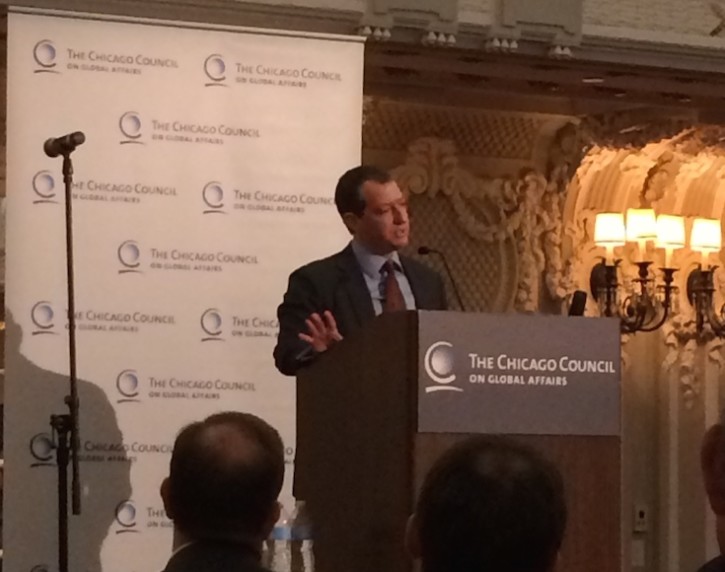 In a speech to the Chicago Council on Global Affairs, Paulson Institute Vice Chairman Evan Feigenbaum argued that Asia is changing dramatically but the United States, notwithstanding its “pivot” or “rebalance” to Asia, is “losing the plot.” He explored three key areas of change with which the United States must wrestle—first, the growing collision between economic integration and security fragmentation; second, the certainty that some pan-Asian ideas, pacts, and institutions that do not include the United States will persist and cohere regardless of American views and preferences; third, and perhaps most important, the reconnection of disparate sub-regions of Asia—East, Central, and South—into a more integrated strategic and economic space.
In a speech to the Chicago Council on Global Affairs, Paulson Institute Vice Chairman Evan Feigenbaum argued that Asia is changing dramatically but the United States, notwithstanding its “pivot” or “rebalance” to Asia, is “losing the plot.” He explored three key areas of change with which the United States must wrestle—first, the growing collision between economic integration and security fragmentation; second, the certainty that some pan-Asian ideas, pacts, and institutions that do not include the United States will persist and cohere regardless of American views and preferences; third, and perhaps most important, the reconnection of disparate sub-regions of Asia—East, Central, and South—into a more integrated strategic and economic space.
Unless Washington adjusts to this more integrated Asia, Feigenbaum argued, the United States could find itself much less relevant in each of Asia’s constituent parts. Feigenbaum explored how the United States should adjust its intellectual, strategic, and bureaucratic approaches to Asia in light of these dramatic changes.
Feigenbaum’s speech drew on three recent and influential essays, with each of his three challenges drawn directly from one of these articles:
- “A Tale of Two Asias” in Foreign Policy;
- “The New Asian Order” in Foreign Affairs; and
- “Why America No Longer Gets Asia” in The Washington Quarterly.
Ultimately, Feigenbaum argued, the United States needs a much more strategically and tactically coherent policy to deal with the scope and rapidity of change in Asia. In particular, it needs a new “map” that better reflects the reintegration of the region, from Japan to Turkmenistan, along historical lines: Gradually, but inexorably, the region is becoming more Asian than ‘‘Asia-Pacific,’’ especially as Asian economies look to one another, not just the West, for new economic and financial arrangements; more continental than subcontinental, as East and South Asia become more closely intertwined; and, in its continental west, more Central Asian than Eurasian, as China develops its western regions and five former Soviet countries rediscover their Asian roots.
It is essential, therefore, to adapt U.S. policy to the contours of change in Asia if the United States wishes to remain vital and relevant there. Otherwise, argued Feigenbaum, who helped shape America’s Asia policy during eight years at the State Department under Secretaries of State Colin L. Powell and Condoleezza Rice, the United States could, within a generation, find its firms at a competitive disadvantage in a part of the world that will constitute as much as half of the global economy. It could miss opportunities to work in new ways with China, India, Japan, and South Korea. It could find itself marginalized from Central Asia entirely. It could be a bystander to the economic and strategic dynamics that are quickly reshaping the region. America needs to focus not just on “the Asia of our wishes, dreams, and fantasies, but of the Asia that is actually emerging down the road.”



